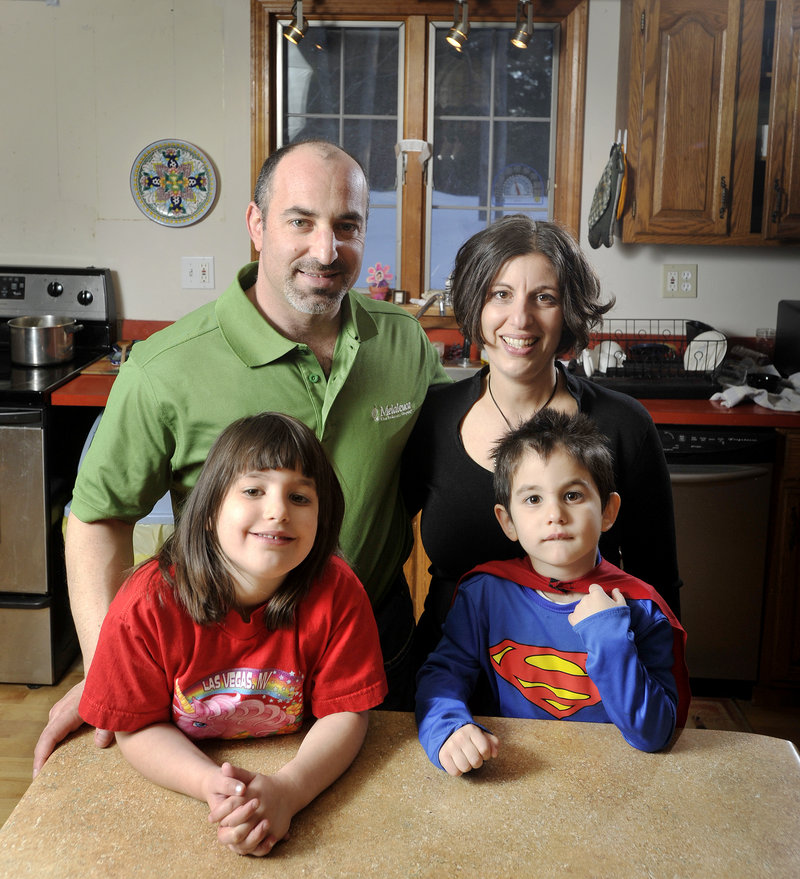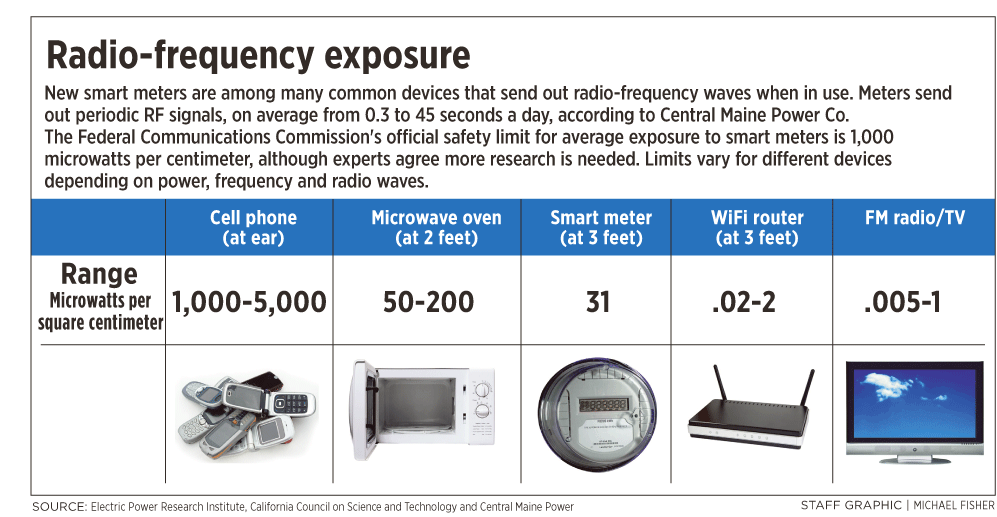Julie Tupper’s home is a wireless-free zone.
“I used to have wireless in the house (for Internet access), and I knew something strange was going on. I had it pulled out and the difference was night and day,” she said.
The joint pain and other aches she had struggled with disappeared, she said. Soon, the cordless phone was gone, too, and the microwave retired. “I (got) all wireless out of my home because I knew it was causing problems for me.”
Tupper, of South Portland, is one of an unknown number of Mainers who consider themselves especially sensitive to the invisible radio frequency waves sent out by wireless communication devices. Some, like Tupper, have turned their homes into safe havens where they can retreat, at least to some degree, from the ubiquitous radio waves floating around most offices, homes and residential neighborhoods.
Now, they say, they also are feeling the effects of new wireless electrical meters — smart meters — that Central Maine Power Co. is installing on homes in their neighborhoods. Some say symptoms such as heart palpitations and sleeplessness were bad enough to force them out of their homes until the meters could be temporarily removed.
Tupper and nine others filed a complaint with the Maine Public Utilities Commission in late February. It is the sixth petition seeking to suspend CMP’s smart meter changeover or force the company to offer an alternative to customers who don’t want the devices on their homes for a variety of reasons.
Maine, followed closely by California, is on track to become the first state to decide whether homeowners have a right to reject the new generation of electricity meters.
“There are utilities all across the country facing this or similar questions,” said John Carroll, spokesman for CMP. “We are ahead of everybody.”
The newest petition is the first one in Maine to focus exclusively on the health issue. It also raises the question of whether customers have a right to keep entire neighborhoods, or communities, free of smart meters and the wireless signals they send.
Health experts and government agencies say there is no scientific proof that the technology has anything to do with joint pains, headaches, dizziness, sleeplessness and other symptoms reported by the 10 Mainers who signed the petition, or by residents in other states who are reporting similar reactions. There also is no conclusive proof that the radio frequency waves are not causing health effects and the question deserves more study, they say.
For CMP, unproven health concerns are not enough to stall new technology that promises to improve the efficiency of the grid and cut costs for the company and its ratepayers.
“There does not appear to be a link that is going to make these people sick,” Carroll said. “The signals from these meters are very, very low-powered.” And, he said, an average meter will only send signals a total of 4.4 seconds during a day.
Those who insist they can feel the health effects, however, say they don’t want to be part of any smart meter experiment.
“You try to maintain your home as a place where you can get away from it,” Tupper said. “People are saying, ‘Oh, this isn’t real.’ This is real. People are getting sick. … Someone like me is the canary in the coal mine.”
Tupper said she’s never been able to hold a cell phone to her head without a sharp headache, and can get heart palpitations or become dizzy when driving near cell towers. “It’s like an allergy. You might not be allergic to mold, but somebody else is,” she said.
CMP agreed to bypass Tupper’s home, at least until the PUC complaints are resolved. But she can feel the signals from her neighbors’ meters, she said. “I was sitting watching TV and I said to my husband, ‘Oh, my God. They’re here. I can feel it,’ ” she said. “It was kind of a jolting sensation.”
While her husband doesn’t feel the radio waves, she said, she can’t go on one side of her property because it’s too close to her neighbor’s smart meter.
“It would be great if we could say for a 250-foot surrounding area, no smart meters.” But, she sad, “what we want to do now is to focus on trying to create a safe haven for ourselves in our homes.”
Gregg Levey, another petitioner, said CMP put a smart meter on the outside of his Falmouth home in December.
“About three or four days after this thing was put in I just started tossing and turning at night, like major insomnia, and I had never had insomnia before,” he said.
Levey made the connection after he mentioned his sleeplessness to a friend who is a smart meter opponent. “She told me insomnia is the No. 1 symptom,” he said.
The Leveys called CMP in early January and, within a day, the company put the old analog meter back on the house.
“Once it was taken out and I started to sleep more, it very much convinced me that this is what was doing it. It was pretty clear,” Levey said. “It’s my home and I should be able to make the choice.”
Gregg Levey’s wife, Anat, said she felt the effects, too.
“With me, it was every time I walked toward the house where the meter was, which happens to be (outside) our kitchen, I got really really dizzy,” she said. “Ever since they removed it, I don’t get that dizziness anymore.”
Nancy Burns, a petitioner from Windham, said she’s dealt with all kinds of allergies and environmental sensitivies her whole life.
“Microwaves I don’t use anymore, with TVs I try to sit back a good distance,” said Burns, who lives in Windham. “I knew the meter would probably be bad for me but I didn’t object when they installed it because I didn’t know I could object.”
CMP installed a smart meter on her home in December, she said.
“At first I started being dizzy when getting up out of bed. I didn’t think anything of it,” she said. “It gradually got worse and worse.”
She had back pain, headaches, confusion and panic attacks, she said. She got relief by sleeping in her car and then in a motel for a few nights before asking CMP to remove the meter, she said.
“I can’t live with it, I know that,” she said. “It’s hard to tell these things to people because they don’t believe you.”
Petitioners said their physicians have been supportive, although few in the medical community have publicly validated the health concerns.
One physician based in Scarborough, Stephen Kirsch, wrote a letter to the PUC last month saying further investigation of the health effects is needed.
“I have been treating one of my patients that I believe has suffered deleterious effects of smart meter installation in her community of South Portland,” Kirsch wrote. He did not identify the patient and did not respond to an interview request last week.
“She has recovered after being hospitalized and returning to her daughter’s home,” he wrote. “She is fearful and unwilling to return to her home. Furthermore, my patient, her daughter and I are concerned that smart meters may be installed around and at her current safe haven in Scarborough.”
Officially, there is no evidence that the waves coming from smart meters — or other common wireless devices, for that matter — are affecting the health of people around them, according to state and federal health and regulatory agencies.
The Maine Center for Disease Control and Prevention presented the PUC in November with a review of government research, in the United States and other countries.
“Our review of these agency assessments and studies do not indicate any consistent or convincing evidence to support a concern for health effects …,” the agency said. It also found no evidence of a link to “symptoms that have been described as electromagnetic sensitivity.”
A more detailed study by the California Council on Science and Technology in January came to the same conclusion, saying smart meters result in smaller levels of radio frequency exposure than cell phones and microwave ovens.
“To date, scientific studies have not identified or confirmed negative health effects,” it said.
The reviews also say more research is needed to identify, or rule out, health effects at various levels of exposure.
So far, the PUC has sidestepped the health issue. In response to previous complaints, it deferred to the Federal Communications Commission, which sets safety standards for wireless transmissions and has deemed the meters to be well within safety limits.
“The commission does not have the institutional expertise regarding potential RF health impacts,” the PUC wrote in a recent filing.
It’s unclear whether the new petition will force the PUC to examine the issue.
CMP is sure to argue that the complaint be dismissed. It has already replied to earlier complaints with testimony from a scientific expert who argued there is no proof of any health effects from the meters or other similar sources of radio frequency waves.
Carroll, the CMP spokesman, said the argument by Tupper and others that they are being affected by their neighbors’ smart meters raises other issues for the company and the smart meter project.
He said the level coming from neighboring homes is similar to the levels given off by the human body. And, he said, homeowners shouldn’t have to get their neighbors’ permission to have a smart meter.
“If you’re living in a neighborhood, you’re within the field of your neighbor’s cell phone or your neighbor’s Wi-Fi router,” Carroll said. “No one has ever exercised a property right that says, ‘Your radio signal is trespassing on my property.’ Under that scenario, you could go over after WBLM radio.”
CMP has so far installed about 137,000 smart meters. About 3,000 households have opted out while the issue is pending before the PUC, Carroll said.
CMP and some lead complainants have met to discuss a settlement of the smart meter dispute. One possible resolution could give customers a choice to opt out — if they agree to pay a higher fee for wireless-free meters.
Allowing customers to simply opt out would jeopardize the benefits of the entire project, as well as the $96 million in federal funds for the two-year smart meter project. “That could erode the effectiveness and efficiency of the system,” Carroll said.
Staff Writer John Richardson can be contacted at 791-6324 or at:
jrichardson@pressherald.com
Send questions/comments to the editors.




Success. Please wait for the page to reload. If the page does not reload within 5 seconds, please refresh the page.
Enter your email and password to access comments.
Hi, to comment on stories you must . This profile is in addition to your subscription and website login.
Already have a commenting profile? .
Invalid username/password.
Please check your email to confirm and complete your registration.
Only subscribers are eligible to post comments. Please subscribe or login first for digital access. Here’s why.
Use the form below to reset your password. When you've submitted your account email, we will send an email with a reset code.